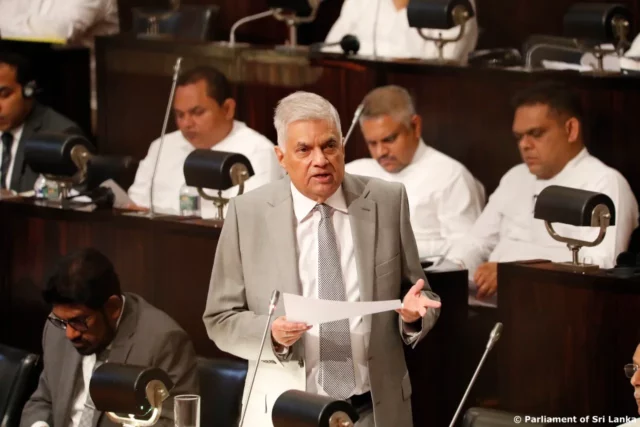Sri Lanka will have to implement a new fiscal framework with a number of crucial economic reforms which can ensure the long-term economic stability of the country, says President Ranil Wickremesinghe.
Tabling the agreement with the International Monetary Fund (IMF) in Parliament, Wickremesinghe noted that Sri Lanka is now commencing a new journey and that the government will have to introduce many economic reforms. “The foundation for our success will be through this path. Some of these reforms have already been proposed and implemented through the Interim Budget of 2022 and the Budget for 2023. We will introduce numerous other reforms,” he added.
Wickremesinghe also told Parliament that the IMF Extended Fund Facility (EFF) would restore Sri Lanka’s international recognition, ensure that the country is not bankrupt and help banks regain international recognition, which would, in turn, create opportunities for low-interest credit, restore foreign investors’ confidence and lay the foundation for a strong new economy.
“The receipt of the IMF facility is a step towards building a better future for the youth and uplifting the country. The credit facility amounts to approximately $ 3 billion over four years, with the first tranche of $ 333 million to be received. Additionally, the country is expecting about $ 7 billion more in rapid credit support from other parties,” the President said.
He claimed that the government aims at reducing the primary deficit to 2.3% of the gross domestic product (GDP) by 2025 and increase revenue to 14% of the GDP by 2026. He also said that the standard corporate income tax rate has been raised to 30%, sectoral tax holidays have been eliminated, the Pay As You Earn (PAYE) tax rate has been raised from 12% to 15%, and the tax exemption limit has been reduced from Rs 300 million to Rs 80 million.
Moreover, he elaborated that the government plans to reduce existing tax exemptions on Value-Added Tax (VAT) by 2024, remove the simplified VAT systems and expedite its reimbursement while an Estate Duty will be introduced as a property tax by 2025, with a minimum tax exemption allowance.
Further, President Wickremesinghe said that the government aims to reduce the inflation rate to 4-6% while planning to reduce the Budget deficit and refrain from printing money. The foreign exchange market thresholds and guidelines will also be relaxed while allowing market criteria to determine its activities. In the same vein, the Central Bank plans to purchase foreign currency to build up foreign reserves.
The President said that with regard to good governance, laws against corruption in line with United Nations Conventions will be drafted together with a new Public Finance Management Bill with strong fiscal policies and laws regarding foreign loans. The government also plans to make public the list of individuals and institutions that enjoy tax concessions and tax holidays, and large-scale government procurement contracts.
Wickremesinghe further said that while some people consider the IMF EFF as just another loan, others claim that the total debt of the country cannot be paid off with the amount received. He noted that these statements show either ignorance or a willingness to betray the country for political gain. “Amidst numerous hardships, bearing all kinds of pressure, and undergoing suffering with equanimity, the people of this country remained calm and patient. Their commitment was a great strength in achieving the IMF facility. Therefore, I must extend my gratitude to the people of this country,” he said.
(By arrangement with ‘The Morning’)
















